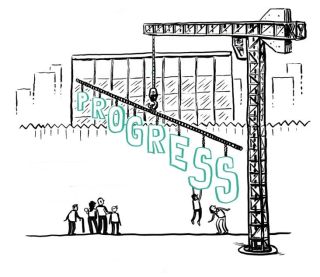Government Success Depends on Delivery

The Programme for Government contained several commitments which, if fully resourced and implemented, would represent significant steps towards creating a fairer and more just Ireland. As we emerge into a new post-Covid reality, our latest National Social Monitor looks at whether Government is delivering on its commitments in key areas and suggests that, so far, Government’s achievements are not matching its commitments.
On Housing
While housing construction has increased in recent years, the proportion of newly built homes bought by institutions has also increased from 5.6 per cent in 2010 to almost one third in 2019. We cannot hope to deliver affordable housing for all if households are competing with institutions in the market. Social housing solutions are not delivering either, with more than one in four tenancies supported by the Housing Assistance Payment between 2016 and 2020 failing.
The full text of our National Social Monitor is available HERE.
On Healthcare
While the Government’s focus has been on dealing with the pandemic, waiting lists for outpatient treatments have increased. Almost three in every 10 people awaiting treatment are on the waiting lists for 18 months or more. These waiting lists must be managed with those who are the most vulnerable or frail given priority.
A mental health crisis is likely to be a prevailing legacy from Covid-19. Investing in the infrastructure at community level to support people living with mental illness, including ensuring sufficient capacity in age-appropriate psychiatric beds, and the ongoing current expenditure to secure continuous service provision, must form part of the Government’s financial projections for Budget 2022 and beyond.
The full text of our National Social Monitor is available HERE.
On Regional Development
Regional development is also an area on which Government has failed to deliver much-needed services. The average distance to most everyday services for rural homes was at least three times longer than for urban homes. For supermarkets/convenience stores, GPs and pharmacies, the average travel distance was seven times longer for rural homes. We need to invest in public services and infrastructure in the regions, particularly in broadband.
The full text of our National Social Monitor is available HERE.
On the Pandemic
One area on which the Government is performing well is in its response to the pandemic, with over half the population satisfied with its response. However, the longer the pandemic continues, the less satisfied the public are becoming, with a decrease of 28 percentage points since Summer 2020.
The full text of our National Social Monitor is available HERE.
Social Justice Ireland’s 20 proposals for Better Delivery
Housing for All
- Adopt Social Justice Ireland’s 10 Point Plan to deliver Housing for All.
Universal Healthcare
- Reduce hospital waiting lists to below 18 months, prioritising those most in need of care.
- Invest in the infrastructure and current expenditure to support increased mental health provision.
Better Opportunities through Education and Research
- Invest in reducing class sizes and pupil teacher ratios at primary and post primary level.
- Use the Department of Education projections in terms of enrolment and staff numbers to inform investment, plan for reducing class sizes, reducing pupil teacher ratios, and ensuring that our education system has all of the resources that it requires to meet our national ambitions.
Balanced Regional Development
- Invest in public services and infrastructure, including Broadband.
- Invest in sustainable rural economies.
- Provide training and upskilling to support a Just Transition.
A Jobs-led Recovery
- Invest in activation programmes, education and training opportunities that specifically target younger workers to avoid a long-term youth unemployment crisis.
- Develop a bespoke policy approach for older workers who are facing the years pre-retirement in unemployment.
Reforming and Reimagining our Public Life
- Implement a process of Social Dialogue involving all, and not just some of, the sectors in Irish society to provide a key mechanism in maximising the resources for moving forward and ensuring citizen priorities are Government priorities.
Income Distribution
- Acknowledge that Ireland has an on-going poverty problem.
- Adopt targets aimed at reducing poverty among particular vulnerable groups such as children, lone parents, jobless households, and those in social rented housing.
- Index social welfare rates to 27.5% of average earnings, an increase of €19 over the next two Budgets.
Taxation
- Recognise the problem of the ‘working poor’. Make tax credits refundable to help address the situation of households in poverty which are headed by a person with a job.
- Support the widespread adoption of the Living Wage so that low paid workers receive an adequate income and can afford a minimum, but decent, standard of living.
A Green New Deal
- Set ambitious emissions reduction targets for 2030 and ensure sufficient resources to support implementation of these targets.
- Adopt targets and a reporting system for each of the Sustainable Development Goals.
Global Citizenship
- Frontload ODA investment between now and 2030 to bring our commitment in line with the Global Ireland strategy.
- Develop a comprehensive strategy setting out a pathway to meeting Ireland’s UN-agreed target of 0.7 per cent.
The full text of our National Social Monitor is available HERE.